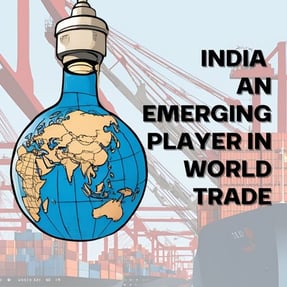India's Role in Trade
India- A Pivotal Player In World Trade


India's Role as a Leader in Shaping Global Trade
India has firmly established itself as a pivotal player in the global trade landscape, leveraging its strategic location, diverse economy, and robust policy framework to drive international commerce.
Economic Powerhouse
India's economy, one of the largest and fastest-growing in the world, contributes significantly to global trade. With a diverse range of export goods—from IT services to agricultural products—India meets global demands across various sectors. The country's GDP growth and economic reforms have positioned it as a key driver of economic activity in the region.
Strategic Trade Partnerships
India actively engages in bilateral and multilateral trade agreements, enhancing its trade relations with countries across the globe. Agreements such as the Comprehensive Economic Partnership Agreements (CEPAs) and the South Asian Free Trade Area (SAFTA) have opened new avenues for trade, reducing tariffs, and fostering economic cooperation.
Leadership in Technology and Services
As a global leader in the IT and services sector, India has revolutionized the global digital economy. The country's technological advancements and skilled workforce make it a hub for software development, IT services, and business process outsourcing, contributing significantly to global trade in services.
Sustainable Agriculture and Food Security
India’s agricultural exports, particularly in staples like rice, spices, and increasingly, millets, play a crucial role in global food security. The emphasis on sustainable agricultural practices ensures long-term viability and meets the rising demand for organic and environmentally friendly products worldwide.
Innovative Manufacturing
With initiatives like "Make in India," the country aims to transform into a global manufacturing hub. This program encourages domestic and foreign investments in manufacturing, promoting exports of high-quality goods ranging from automobiles to textiles and electronics.
Policy Reforms and Trade Facilitation
India's government has implemented several policy reforms to enhance ease of doing business and streamline trade processes. The introduction of the Goods and Services Tax (GST) has simplified the tax structure, while measures to improve port infrastructure and logistics efficiency have reduced export-import turnaround times.
Champion of Multilateralism
India plays an active role in international organizations such as the World Trade Organization (WTO), advocating for fair trade practices and the interests of developing nations. Its leadership in global forums helps shape policies that promote inclusive and sustainable trade growth.
Human Capital
The country's large and youthful population is a significant asset, providing a steady supply of skilled labour. Investments in education and vocational training ensure that India’s workforce is equipped to meet the demands of a globalized economy.
Innovation and Entrepreneurship
India’s vibrant start-up ecosystem, supported by government initiatives and venture capital, fosters innovation and entrepreneurship. This dynamic environment not only drives domestic economic growth but also positions India as a leader in developing innovative solutions that have global applications.
Global Supply Chain Integration
India’s strategic initiatives to integrate into global supply chains make it a vital link in global manufacturing and distribution networks. The country's ability to adapt to changing global trade dynamics ensures its continued relevance and leadership in international trade.
In conclusion, India's role as a leader in shaping global trade is multifaceted, encompassing economic strength, strategic partnerships, technological innovation, and a commitment to sustainable practices. By continuously evolving and adapting to global trends, India is poised to remain a key player in the global trade arena.

Global Traders
Trusted suppliers of sustainable and ethical products worldwide.
Contact
Genuine
contact@inicioexports.in
8928441548
© 2024. All rights reserved.